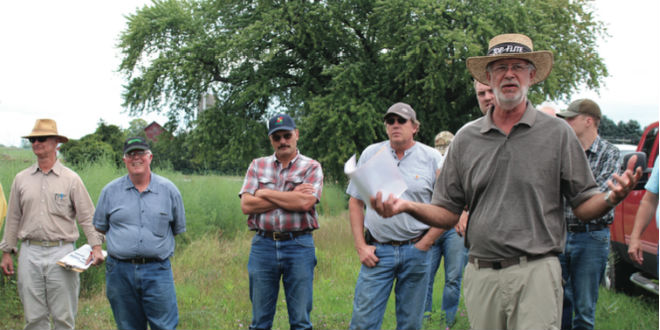
May 4, 2021Asparagus Day a discussion forum
International expertise, regional research and industry insights were presented to Michigan asparagus growers on March 11 at Oceana Asparagus Day.
Twelve months ago, COVID-19 was just beginning and a few lockdown procedures were in place. This year, however, the presentations were conducted via a webinar instead of the friendly confines of the church gym where the growers usually meet in downtown New Era, Michigan.
International perspectives
Claire Donkin of Global Plant Genetics, which represents four leading asparagus breeders, presented the “UK perspective on varietal performance.”
She discussed differences in the market, storage and seasonal supply and demand. There are also differences in how individual varieties grow in the United Kingdom versus North America.
“Guelph Millennium, for you guys, I don’t believe is recognized as a late variety,” she said during a question-and-answer session. “For me, it is. I can’t take data from other climates and extrapolate how it’s going to behave in the U.K.”
Personnel changes

John Bakker, a fixture of the Michigan asparagus industry, announced he was scaling back his involvement in a few roles. In addition to the main job as executive director of the Michigan Asparagus Advisory Board (MAAB), Bakker currently serves as executive director of the Michigan Carrot Committee, executive secretary of Michigan Asparagus Research Inc. and manager of the Michigan Asparagus Industry Research Farm – he’s planning to drop all but the latter role while adding some work at the Earl & Linda Peterson West Central Michigan Research & Extension Center.
“I think most of you know this, but if you don’t, I’m retiring, sort of,” he said. “I will continue to work at the asparagus research farm for a few years, and as of last night, am officially a part-time employee of MSU Extension – I have accepted a position at the new tree fruit research facility which is located right next to the asparagus research facility. So, I’m going to be managing both those facilities for a few years. It’s not that I’m going away. I’m just going to slow down, hopefully, have a chance to catch a few more fish, spend some more time up at my cabin.”
Assessment rate reduction
Bakker reported that the MAAB had decided to reduce its assessment rate from 1.75 cents per pound of asparagus to 1.5 cents.
“We are actually getting into a situation where fund balance is higher than what we feel we need,” Bakker said. “There’s a lot of discussion on what we want to do with the assessment rate this year, but due to some potential things on the horizon, the board decided to reduce the rate to one and a half-cent this year.”
The assessment rate had been at 1.75 cents since 2012. Next year, the rate could return to the previous rate or possibly even increase, he said.
Marketing moves
Jen Velasquez, director of marketing at Full Tilt Marketing, spoke about Michigan Asparagus’ marketing campaign. A digital campaign is plugging into social media influencers and trends associated with the COVID-19 pandemic.
Consumers are interested in health and building their immune systems, she said. Some, displaced from their offices and restaurants, are learning to cook for the first time. At-home restaurant experiences and virtual cooking classes are examples of some of the pandemic-related trends.
Still, much of the campaign’s message remains the same.
“For 2021, we’re not going to completely forget everything we’ve talked about in the past,” she said. “We’re still going to talk about having thicker spears and better texture and better flavor. Michigan asparagus is easy to prepare. You don’t have to overcook your veggies to make them taste good. You do still want to buy fresh and local. And sustainable is still here. All those messages are going to be reinforced as we focus on reaching more people and wider audiences.”
— Stephen Kloosterman, associate editor
















